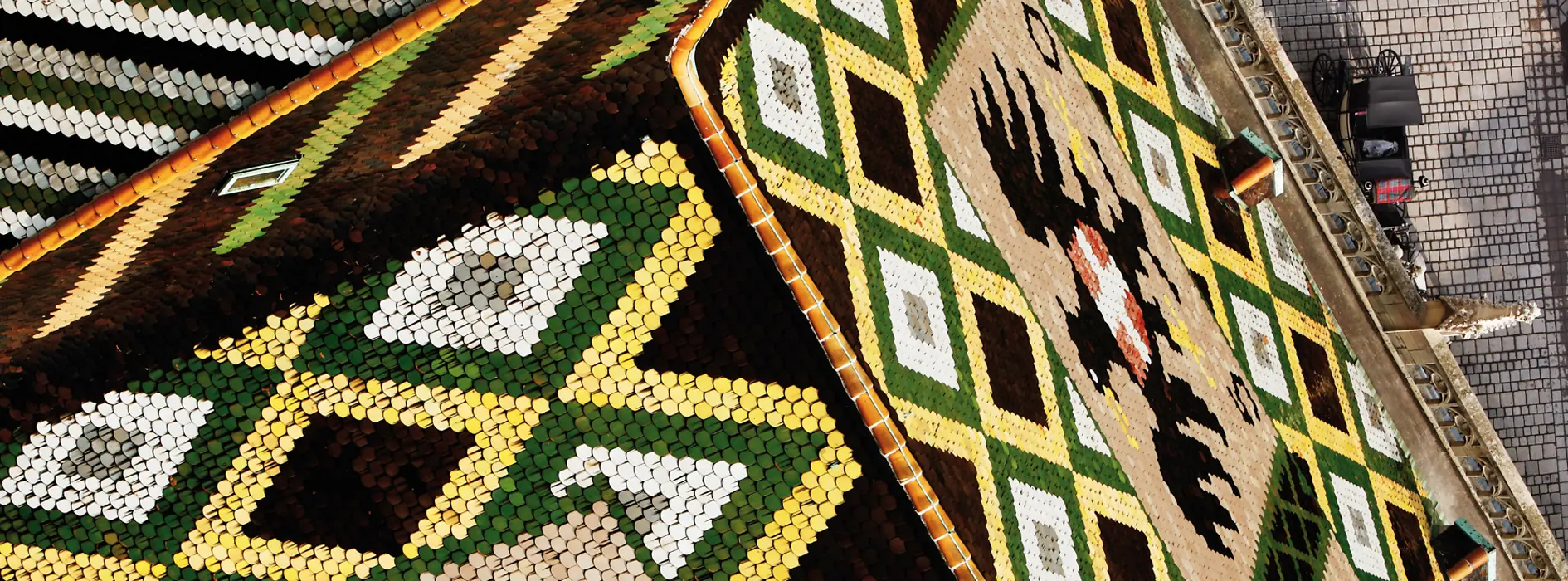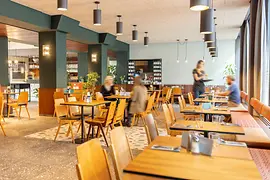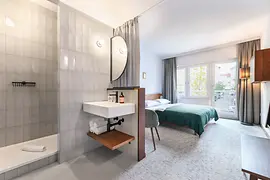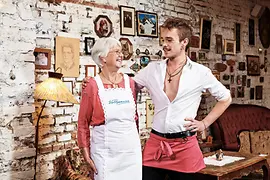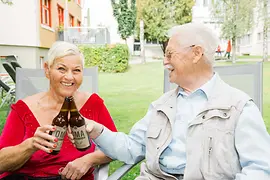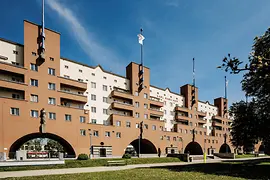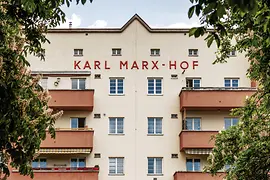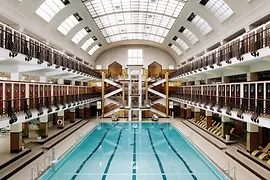Vienna Media News – December 2022 Why Social Businesses Thrive in Vienna
Vienna has proven its social credentials time and again, ever since the Red Vienna era of 1919. Various social business projects are showing how effectively this way of thinking and acting can be applied in the present day.
Magdas Hotel – Social Business Counters Labor Shortage
magdas Hotel, Austria's first social business hotel, belongs to the Archdiocese of Vienna’s Social Business Group, which was founded in 2012. The magdas Group’s overarching aim is to use entrepreneurialism to tackle social issues wherever it makes sense to do so. The name also has echoes of the German phrase “Ich mag das”, or I like that – which is something the business definitely wants to hear from its people! In addition to hotel operations, magdas is involved in various other areas including cleaning, recycling and food delivery. At present, magdas’ different social businesses employ more than 200 people. The social business idea takes its cue from the ideas of the Nobel Prize winner Muhammad Yunus: all profits are reinvested. And it does not receive any subsidies that are not available to other private companies.
Located in the second district from 2015 to 2021, magdas Hotel officially reopened – with the same goals in mind – at a new location on November 10, 2022: a former Caritas seminary and old folks home at Ungargasse 38 in the third district. The move was made possible thanks to a crowdfunding campaign that raised EUR 57,306 as well as a five-year EUR 1.5m loan from Caritas. To get by with the resources available, the focus was placed on recycling and upcycling wherever possible. In partnership with Austrian architects BWM and local artist Daniel Büchel, existing fixtures and fittings – such as the built-in cupboards once used by the senior citizens – were dismantled and transformed into tables, lamps and benches during the fit-out, which lasted from February 2021 to October 2022. Numerous donated items, high-quality materials (including quality Backhausen fabrics) and carefully restored furniture have been artfully brought together to create the hotel’s unique interior. Special highlights included the 1960s chapel on the sixth floor, a pair of wheelchair accessible rooms, two rooms especially for visually and hearing impaired hotel guests, and energy efficient measures throughout the building.
More than 80 people who arrived as refugees have already embarked upon their careers at magdas Hotel – many of them having already moved on to other companies in the meantime, helping to alleviate the burden on the labor market in the process. The idea is to make it easier for the long-term unemployed, people with disabilities, migrants and former prisoners to access the job market. Integration and training schemes like this have proven to be highly effective and far-sighted measures that also have the capacity to address labor shortages, particularly in times of crisis. At present, around two thirds of the 35 employees – who work in a range of roles from housekeeping and catering to front office management – are former refugees. Their personal successes are made possible by targeted care and support ranging from German courses and additional tutoring for vocational school, to special technical courses. Once a year, an intercultural workshop is organized for the entire workforce to support cooperation within the international team. A social worker is also on hand to answer any questions the staff may have.
- 3rd district, Ungargasse 38, www.magdas.at/magdas-hotel/
Habibi & Hawara’s Three-Pronged Approach: Social, Economic and Environmental Sustainability
Ever since it opened back in 2016, Habibi & Hawara has followed a three-pronged approach: social, economic and environmental sustainability. Habibi & Hawara Gastronomiebetriebe GmbH is a private and independent training and integration program for people with refugee or migrant backgrounds – who now account for two thirds of the company's headcount. The company offers employment for fair pay, high-quality training and a working environment that is shaped by respect. One of the special features of the business model is that it puts various measures in place to help employees on their way to becoming entrepreneurs in their own right.
Update 26 January, 2023: Due to insolvency, all locations are closed except for the restaurant in the 3rd district:
- 1st district, Wipplingerstrasse 29, Habibi & Hawara Eins, https://habibi.at/
- 2nd district, Bruno-Marek-Allee 23, Habibi & Hawara Nordbahn
- 3rd district, Platz der sozialen Sicherheit, Habibi & Hawara Landstrasse
- 7th district, Siebensterngasse 46, Habibi & Hawara Siebenstern
- 22nd district, Simone-de-Beauvoir-Platz, Habibi & Hawara Seestadt
Multi-Generational Café: Inclusion to Help Combat Poverty in Old Age
Viennese social enterprise and senior citizens’ café Vollpension, where pensioners bake and wait tables, was founded ten years ago. The twin ideas behind this were to combat old-age poverty and take steps to address the problem of loneliness in old age, something which is particularly prevalent in cities. Founders Mike Lanner, Moriz Piffl, Julia Krenmayr and David Haller shared a vision of a world in which old and young people learn with – and from one another – as equals, living their lives together and helping each other. The ethos is all about putting shared interests ahead of the things that set people apart – in short, there should be no place for poverty and loneliness in old age in today’s society.
The latest project is baking courses run by grannies – for locals as well as visitors to Vienna. All of the senior citizens are employed on mini-job contracts, which enables them to earn a little extra tax-free to top up their monthly pension. In total, 45 pensioners each work around ten hours a week at Vollpension and bake up to eight cakes in a regular shift at the café.
On weekends, patrons queue up in front of the café on Schleifmühlgasse in the fourth district for various treats including the famous "Germ-Buchteln" (a hybrid donut/brioche creation from Bohemia) with damson filling and vanilla sauce. In 2019, a second weekends-only location opened at the Music and Arts Private University of Vienna (MUK) on Johannesgasse in the first district. At Schwedenplatz, the Vollpension kiosk is also a magnet for fans of homecooked food.
- 4th district, Schleifmühlgasse 16, www.vollpension.wien/
- 1st district, Johannesgasse 4a
- 1st district, Franz-Josefs-Kai 13, Kiosk am Schwedenplatz
For a printable version of this image, please contact: https://www.vollpension.wien/presse/
Beer Brewing and Assisted Living
In Atzgersdorf in the 23rd district, retirement home residents regularly get hands-on in special workshops. While mainly centered on beer brewing, there are also sessions devoted to the production of honey, herbal mixtures, schnapps and desserts. Involved in the process to the fullest extent possible, participants have a hand in everything from brewing the beer to labeling the bottles. Shown to have a positive impact on overall wellbeing, it also helps enhance the retirees’ sense of belonging and improve their motor skills.
- 9th district, Seegasse 9, Kuratorium Wiener Pensionisten-Wohnhäuser https://kwp.at/brauwerkstatt/
Red Vienna Ca. 1919
After the First World War, Vienna devoted all of its energies to reconstruction. Living space was scarce. In the outer districts people lived in illegally-built settlements which were beset with cold and damp, with outbreaks of disease all year round. The first fully-free Vienna City Council elections in 1919 brought the Social Democratic Workers’ party an absolute majority – in terms of both votes and councilors. "One day these bricks will speak for us," were the prophetic words of Mayor Karl Seitz at the official opening of the Karl Marx Hof – named for the Father of Communism – on October 12, 1930 in Heiligenstadt.
Poverty and destitution were kept at bay through effective social democratic policies as well as a wave of construction that continues to define the cityscape to this day. Over the years that followed, the city would build more than 64,000 municipal apartments and allocated them according to a needs-based points system. The funds required were raised from a payroll tax and a subsequent housing tax which was first levied in 1923. Workers took up residence in practically designed housing complexes featuring heating, communal gardens, ample living space and access to cultural facilities and medical care. Many of these municipal buildings boasted beautiful details and impressive art deco and Bauhaus elements. Monumental buildings from the era, such as the Karl-Marx-Hof (the longest contiguous residential building in Europe) and the art nouveau Amalienbad public pool (in the workers' district of Favoriten) are known internationally. Many of the architects behind them were students of Otto Wagner.
- 19th district, Heiligenstädter Strasse 82-92, 1190 Vienna Karl-Marx-Hof (https://www.wien.info/en/sightseeing/red-vienna/social-housing-buildings-359256, https://dasrotewien-waschsalon.at/karl-marx-hof
- 10th district, Reumannplatz 23, Amalienbad, www.wien.gv.at/freizeit/baeder/uebersicht/hallenbaeder/amalienbad.html
- Red Vienna www.wien.info/en/sightseeing/red-vienna/100-years-of-red-vienna-337622
Contact
Helena Steinhart
Media Relations
+43 1 211 14-364
helena.steinhart@vienna.info
